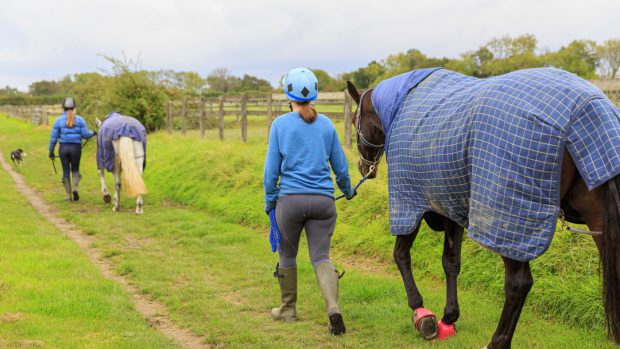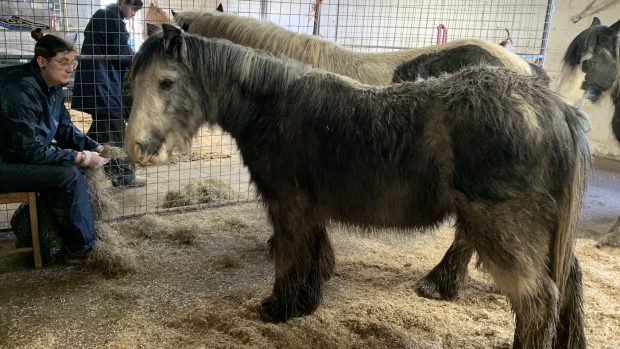International outcry has been caused by a herd of brumbies starving in Australia’s Barmah national park.
A period of drought followed by artificial flooding of up to 90% of the land has marooned the horses in a barren area of the park without enough food to survive.
Many of the horses have had to be shot by rangers after their body condition scores dropped below 1.5, with witnesses describing the scene as like a “horse cemetery”.
Supporters fighting to save the historic herd, which has roamed the area for 180 years, have stepped in to hay the horses but have been threatened with fines for attempting to feed them on national parkland.
Murray Willaton from the Barmah Brumby Preservation Group explained that while the land had often been flooded by the Murray Darling Basin Authority at this time of year, the situation had been exacerbated by a major drought.
“The animals have had to move into a small area with no feed. It’s like taking all of your horses out of their paddocks and putting them all in a yard for a month and not feeding them. It is extreme cruelty,” he said.
“Parks Victoria is refusing to respond by feeding these animals, so it’s created a lot of disgust from the public. We have volunteers who are feeding them but Parks Victoria have placed signs on each entrance gate warning people that it is illegal and they also have enforcement offices patrolling the park trying to catch us.

“Why is a government agency allowed to get away with this cruelty?” he added. “If a normal person did this they would have been prosecuted by now.”
Murray told H&H volunteers had been able to get hay to around 70 of the horses as they had strayed on to neighbouring private land through gaps in the fencing. Foals and yearlings have been hit particularly hard by the lack of food, and HOOFS2010 Brumby Rescue has taken in six orphan foals.
“We will not be threatened into stopping feeding these animals,” he said. “It’s not just horses affected either, it’s native animals like kangaroos as well.”
Although the herd only numbered around 170— easily supported by the 77,000-acre park — Murray said “a suspicious person” might think the situation was an excuse for a “cull” of the horses, which are not protected because they are a non-native species.
“Ultimately, what we want is for a small amount of the horses to stay, for them to be protected and to be managed professionally,” he said. “We would also need an agreement on flooding the forest in winter rather than summer when it causes so much damage and misery — if they need to flood at all. The flooding is not natural.”
He said that the group would continue to try and liaise with agencies, although previous attempts to formulate a management plan had failed. He blamed the frustrations on a culture “heavily influenced by environmental scientists” who are against introduced species.
“The environmental government agencies have made it very clear that they don’t want wild horses on public land like national parks. We have been trying to work with these agencies for the past six years but they are not willing to negotiate.
“We have provided them with a management plan where a small amount of horses could stay in the national park and we could manage them but they will not budge from a total eradication and our community will not accept that,” he said.
Murray added that local people are joining forces to make sure the horses survived and “remained a part of the Barmah national park for ever”.
“These horses are so important to our local heritage,” he said. “They have an historical link to the world wars, when young farmers from this area went to fight and released their horses into the park so that they would be looked after by the herdsman. A lot of these soldiers never returned from the war and those horses are a part of the breeding that we now have. These horse have been a part of this park — or as it used to be called the Barmah Forest — for 180 years.
“Our heritage is just as important as anyone else’s and we will not quit.”
In a statement, Parks Victoria acknowledged the impact of the drought on both “native and introduced” animals and said that during “natural environmental cycles…unsustainable populations decline”.
It said the authority had been monitoring “malnourished feral horses” and receiving assistance from RSPCA Victoria regarding their welfare. The organisation confirmed that some horses had been put down to “prevent further suffering”.
“This has been undertaken in a controlled manner and under strict protocols, following consultation with a veterinarian,” it said.
The statement also confirmed that regulations prevent people feeding animals within the park.
Continues below…

Riders’ heartbreak as government ‘leaves horses to starve’
Fiona Bigwood, Charlotte Dujardin and Hans Peter Minderhoud are among those calling for change

‘Amersham horses were not starved — they had worms’
Top vet tells Bicester Magistrates Court that he believes Amersham horses' poor condition was caused by ineffective worming, not starvation

Subscribe to Horse & Hound this spring for great savings
“Feeding animals can maintain populations at unsustainable levels, adding pressure to the environment, and can create a dependence on non-natural foods. If familiarised with people, animals can stop foraging on their own and become dependent on human intervention.
“Regular feeding of animals can attract predators, while domestic animal feed can introduce invasive weeds to a national park.
“With summer approaching, on-ground conditions in many of the state’s national parks and reserves are expected to deteriorate,” it continued. ”In Barmah National Park, Parks Victoria has increased patrols and will continue to monitor the health of feral horses and native animals, and respond to reports of malnourished animals.”
A fund has been set up for hay for the Barmah brumbies.
For all the latest news analysis, competition reports, interviews, features and much more, don’t miss Horse & Hound magazine, on sale every Thursday.





